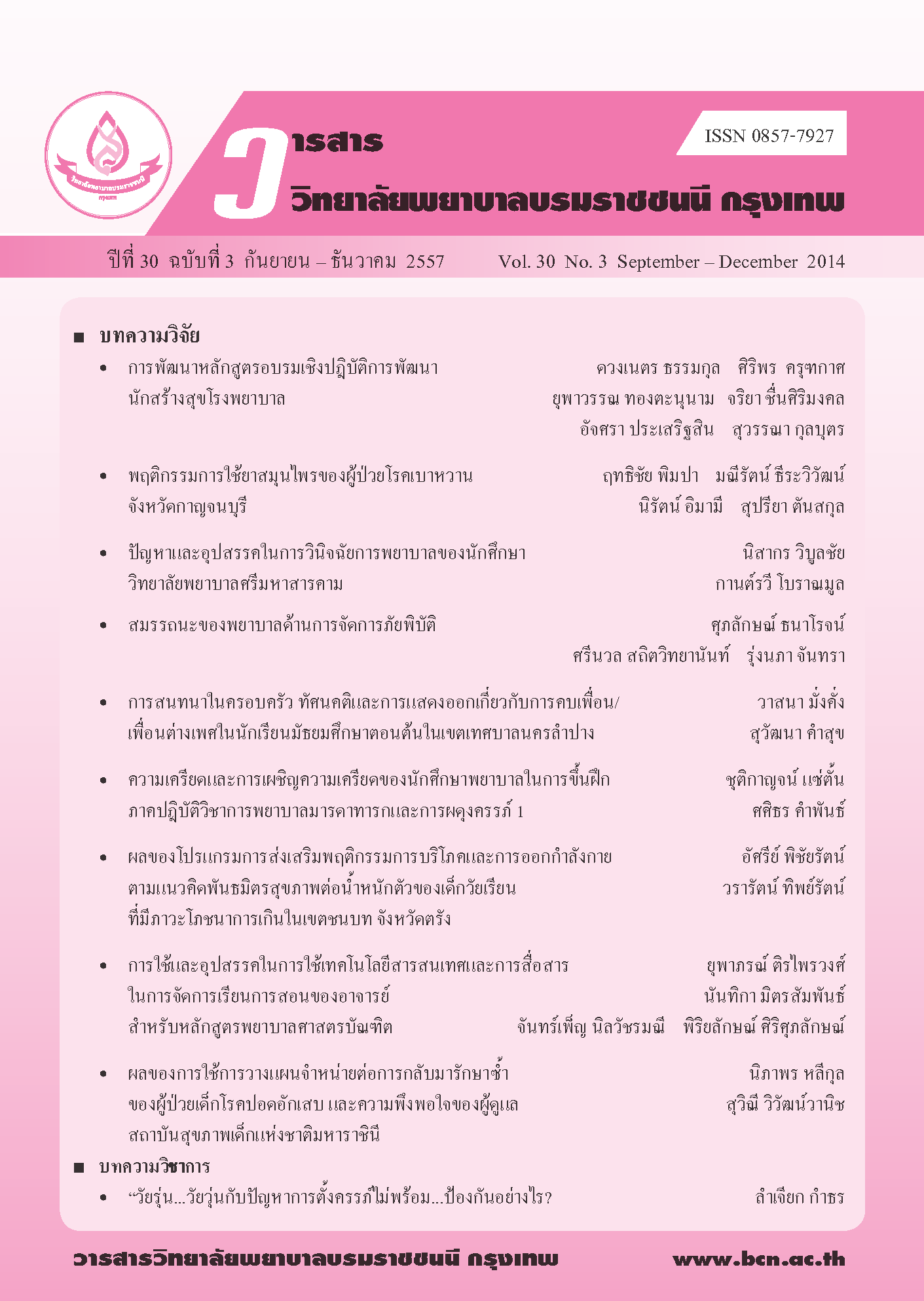การสนทนาในครอบครัว ทัศนคติและการแสดงออกเกี่ยวกับการคบเพื่อน/ เพื่อนต่างเพศในนักเรียนมัธยมศึกษาตอนต้นในเขตเทศบาลนครลำปาง FAMILY COMMUNICATION, ATTITUDE, AND PRACTICE RELATED TO FRIENDSHIPS AMONG JUNIOR HIGH SCHOOL STUDENTS IN NAKHON LAMPANG MUNICIPALITY
คำสำคัญ:
วัยรุ่น, การคบเพื่อน, teenagers, friendshipsบทคัดย่อ
บทคัดย่อ
การศึกษาครั้งนี้มีวัตถุประสงค์ เพื่อศึกษาการสนทนาในครอบครัว ทัศนคติและการแสดงออกเกี่ยวกับการคบเพื่อน/เพื่อนต่างเพศ กลุ่มตัวอย่างเป็นนักเรียนมัธยมศึกษาตอนต้นในโรงเรียนสังกัดสามัญศึกษาเขตเทศบาลนครลำปาง จำนวน 308 คน โดยการสุ่มตัวอย่างแบบง่าย (Simple Random Sampling) จากนักเรียนมัธยมศึกษาตอนต้น แต่ละชั้น แบบสอบถามประกอบด้วย 1) ข้อมูลทั่วไป และแบบสอบถามเกี่ยวกับ 2) การสนทนาในการคบเพื่อน/เพื่อนต่างเพศ 3) ทัศนคติ และ 4) การแสดงออกของวัยรุ่นที่มีต่อการคบเพื่อน/เพื่อนต่างเพศ รวม 57 ข้อ สถิติที่ใช้ คือ ร้อยละ พบว่ากลุ่มตัวอย่างส่วนใหญ่เป็นเพศหญิง (61.8%) มีอายุเฉลี่ย 14 ปี (S.D.=1.08) การสนทนาในครอบครัวส่วนใหญ่ผู้ปกครองห้ามมีแฟน (46.1%) และถ้ามีให้อยู่ในขอบเขต (61.88%) แต่วัยรุ่นเห็นด้วยกับการให้มีแฟนได้ (86%) และอยากแสดงออกในการคบเพื่อนต่างเพศให้อยู่ในขอบเขต (65.7%) ผลการศึกษานี้สรุปได้ว่าผู้ปกครองและกลุ่มตัวอย่างยอมรับการคบเพื่อนต่างเพศในวัยรุ่นได้ และเพื่อให้พัฒนาการทางเพศของบุตรวัยรุ่นเป็นไปอย่างเหมาะสม ควรส่งเสริมการสื่อสารเรื่องเพศให้มารดาและบุตรวัยรุ่นด้วย
Abstract
The purpose of to this study was examine a pattern of family conversation, including teenagers’ attitudes and actions related to having a friendship with another gender. This cross-sectional design approved by the ethics committee of Boromarajonani College of Nursing, Nakhon Lampang. Sampling included 308 junior high school students using convenient sampling from two schools in Nakhon Lampang Municipality. Self-administered questionnaires included 50 items related to their patterns of a family conversation, including teenagers’ attitudes and actions related to having a friendship with another gender, and general personal questions. Psychometric properties of the measure were examined by using content validity with three expertises. Mean, standard deviation, frequency, and percent applied to assess data in this study.
The results showed that most of the sample was female (61.8%) with mean age of 14 years old (S.D. = 1.08). Most of the samples stated that their parents would not allow them to have a boy or girl friend (46.1%); and if they have one, they should be under their parents’ views (61.88%). When asked about their attitudes regarding their conversation with their parents, they thought that they should be allowed to have a boy or girl friend (86.0%). They also have a boy or girl friend with their parents’ permission (65.7%). These findings suggested that teenagers and their parents accepted to an idea that “their teenager can have a boy or girl friend”.
Downloads
ดาวน์โหลด
เผยแพร่แล้ว
รูปแบบการอ้างอิง
ฉบับ
ประเภทบทความ
สัญญาอนุญาต
บทความที่ได้รับการตีพิมพ์ เป็นลิขสิทธิ์ของวารสารวิจัยสุขภาพและการพยาบาล (วิทยาลัยพยาบาลบรมราชชนนี กรุงเทพ) ไม่สามารถนำไปตีพิมพ์ซ้ำในวารสารฉบับอื่น


















